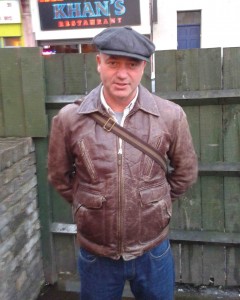
Barney Evison caught up with Brixton author Howard Cunnell, whose second novel, The Sea on Fire, came out in March 2012. He is the editor of Jack Kerouac’s On the Road – The Original Scroll, and a former scuba diving instructor and guide who spent 10 years working as a lifeguard at the Brockwell Lido. He gave a reading from his book at the Brixton Book Jam last Monday.
Howard Cunnell moved to Brixton 15 years ago and feels it’s his true home. Walking through the centre of town with him, it’s hard not to believe him. People wave and shout hello from across the street, and he points out local landmarks and the former locations of famous shops as we walk down Atlantic Road and Coldharbour Lane. He evidently harbours a great love for Brixton and is an active member of the local community. When we spoke, he also seemed deeply concerned about some of the recent changes in Brixton.
Howard is worried that as property prices shoot up and the Clapham-based white middle classes invade central Brixton, the older, poorer communities are being elbowed out.
“From Brixton Village on a Thursday night, where everyone is sitting around eating their dim sum, you can walk 10 minutes down the road to Loughborough Junction and see something completely different going on,” he tells me. “It’s an obvious disparity, and at some point it’s got to give.”
He worries that Brixton may be losing some of the sense of community that it has held it together so tightly until now.
“Some newcomers to the area feel there is a sense of entitlement,” he says, a symptom that “people are not conscious of the land they are standing on and the historical significance it has for the people living here. My local, the Effra, is a good example of this. When I first moved here, it was predominantly a Jamaican men’s pub – being there was also a hugely educative experience. People told stories and had a lot of respect for each other.”
He still loves the Effra and thinks the owners have done an impressive job of remaining open to all, old and new communities alike, but worries that many of the young middle-class professionals with whom it is now so popular barely skim the surface of the culture around them.
Howard is quick to dispel his own position as an authority on the area – “in some ways, as a white immigrant, I don’t feel entitled to write about Brixton” – and he places great emphasis on the tolerance and respect that he has always encountered here. His own turbulent childhood left him looking for a more stable environment to raise his children in and he found that in Brixton. He tells me that being a part of the local community is a constant source of encouragement and support as a father.
He affirms Brixton’s culture – or counterculture – as one of enduring vibrancy: “there has always been great writing in Brixton,” says Howard. With important Brixton books from people like Geoff Dyer, Martin Millar and Alex Wheatle, Howard is sure that novels about Brixton are becoming more visible, and representing our community in contemporary literature in a way that is hugely valuable.
Howard goes on to add that there was a lot about Brixton in his latest novel, The Sea on Fire, which didn’t make the final edit, depicting Brixton as a refuge for the disenfranchised, the disillusioned and the non-conformers. “Kim [the novel’s protagonist] is hostile to conformity and consumption, and Brixton represents an escape from all that.” He hints that his next book, a work-in-progress, will have a lot more about the area and will be what he calls his “Brixton novel”.
Essentially Howard sees Brixton as facing the same problems as the poorer areas of any city. He rebukes the current government for the “shameful” way in which it seems to be ignoring the needs of South London estates, adding that the Olympics is simply a “corporate jolly” that does not relate to Brixton at all. Amongst other things, he worries that Brixton’s libraries – where he wrote most of his two novels – are under threat from a misguided austerity programme.
Nonetheless, Howard is genuinely optimistic about Brixton’s future.
“What is good about Brixton is good about London: the diversity of different cultures. You can walk down the street and hear 15 different languages spoken”, he says. “I love it. It has a great openness. You could be anywhere, but it still has that Brixton feel.”
The Sea on Fire is now available on Picador. In their review, The Guardian said “Cunnell maps new noir territory in an incandescent underwater world, where shipwrecks and luminous sharks are described as precisely as the madness and weakness in the hearts of men, the slipperiness of relationships and identity, with a quest to find what really lies beneath.”
Follow Barney Evison on Twitter @BarneyEvison.







[…] do get rather doey-eyed over the Golden Days of Brockwell Lido. I think back to Paddy, Casey, Howard, Dog and of course Dangerous. Out of the Blue is my current bedtime reading material of […]
So its okay and not racist to complain about white people moving to a city now?
Brixton IS for everyone , take a look at the excellent The History of The World on BBC presented by Andrew Marr and see how places change, in fact the whole world is for everybody and the only constant is change . Right now London and other big cities are being regenerated so that relatively wealthy working people can be close to their place of work . In the case of Brixton that is returning in some ways to its roots, a town for lively trade and commerce attractive to middle classes – and a much better reputation to have than one dominated by crime , violence and neglect , still etched in the minds of the rest of UK residents outside of Brixton. The future may bring back decline as things tend to be cyclical, but for now let’s not talk Brixton down, there are enough outsiders still doing that very well
A totally refreshing article , I thought it was only me , seeing all these white middle class ,moving in , but don’t give a shit about the town , its trendy to them ,adds to the dinner conversation, just like the yuppies that invaded Battersea. No blacks no Irish, no dogs , that what my mum got , until someone helped her in Brixton, now you people are turning it into to the boring pimp a clock , place to left, but that’s what you think , we are wise to you……
I very clearly am in now way denying Jamaicans a place In my 4 line post…and I’m not your mate. You keep throwing out insults like bigot to people you don’t know and prove what everyone who knows you already suspects.
David, only a bigot would talk about this “great black culture” using those words, and only a bigot would deny the biggest Jamaican community in EUROPE it’s place, simple as that. Black people didn’t arrive yesterday, mate, and like it or not, Brixton is home to many British Jamaicans.
BRixton wasn’t always black you big hero. I am a 4th generation white Brixtonite and smarmy comments about white people going to the effra wrecking the (most recent) vibe of the place is pretentious bullshity IMHO.. Don’t be so precious about all this great ‘black culture’ you are not part of. Brixton is for everyone.